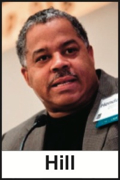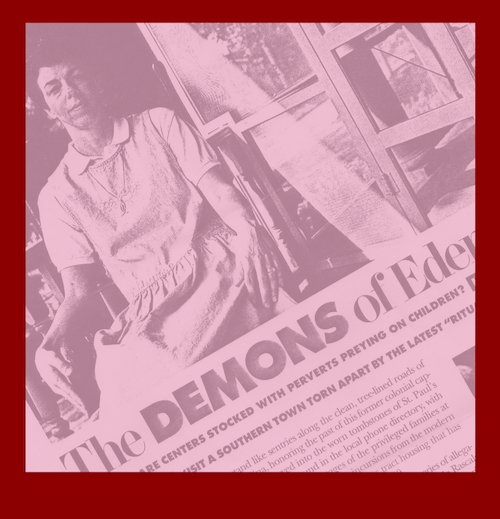Rascals case in brief
In the beginning, in 1989, more than 90 children at the Little Rascals Day Care Center in Edenton, North Carolina, accused a total of 20 adults with 429 instances of sexual abuse over a three-year period. It may have all begun with one parent’s complaint about punishment given her child.
Among the alleged perpetrators: the sheriff and mayor. But prosecutors would charge only Robin Byrum, Darlene Harris, Elizabeth “Betsy” Kelly, Robert “Bob” Kelly, Willard Scott Privott, Shelley Stone and Dawn Wilson – the Edenton 7.
Along with sodomy and beatings, allegations included a baby killed with a handgun, a child being hung upside down from a tree and being set on fire and countless other fantastic incidents involving spaceships, hot air balloons, pirate ships and trained sharks.
By the time prosecutors dropped the last charges in 1997, Little Rascals had become North Carolina’s longest and most costly criminal trial. Prosecutors kept defendants jailed in hopes at least one would turn against their supposed co-conspirators. Remarkably, none did. Another shameful record: Five defendants had to wait longer to face their accusers in court than anyone else in North Carolina history.
Between 1991 and 1997, Ofra Bikel produced three extraordinary episodes on the Little Rascals case for the PBS series “Frontline.” Although “Innocence Lost” did not deter prosecutors, it exposed their tactics and fostered nationwide skepticism and dismay.
With each passing year, the absurdity of the Little Rascals charges has become more obvious. But no admission of error has ever come from prosecutors, police, interviewers or parents. This site is devoted to the issues raised by this case.
On Facebook
Click for earlier Facebook posts archived on this site
Click to go to
Today’s random selection from the Little Rascals Day Care archives….
Click for earlier Facebook posts archived on this site
Click to go to
Today’s random selection from the Little Rascals Day Care archives….
When ‘overwhelming community sentiment’ wins
 June 10, 2013
June 10, 2013
“The danger posed by courts and prosecutors who abdicate their responsibilities to uphold the Constitution in favor of overwhelming community sentiment was recently illustrated in State v. Robert Fulton Kelly Jr.
“The trial prosecutor and the Superior Court judge were so overwhelmed by community sentiment that the trial was converted from a proceeding to adjudicate Mr. Kelly’s guilt or innocence into a forum to assist the families of the scores of alleged child victims recover from the gut-wrenching allegations of the 100-count indictment. The result: Justice was poorly served.
“The individuals thought to be victims and their many family members, loved ones and neighbors were frustrated, angered and in the end felt cheated. The individuals accused of heinous abuse of scores of children were deprived of a fair trial and deprived of liberty for more than three years.”
– From a talk by Henderson Hill, director of the N.C. Resource Center, Office of the Appellate Defender, at the Senator Sam J. Ervin Jr. Constitutional Issues Program, (May 18, 1995)
We believe them, we believe them not….
Oct. 26, 2012
“As in the McMartin case, the North Carolina ‘experts’ dismissed absurd elements of the children’s stories and fixated on the guilt of the caretakers.
“When a child put two dolls together, it counted as evidence; when he claimed that Miss Dawn cooked him in the microwave, he was taken to be speaking figuratively.”
– From “Day Care, Satanism and ‘Therapy’” by Alexander Cockburn in the Los Angeles Times (Sept. 5, 1991)
What assistant AG ‘found interesting’ about Elle article
 Nov. 26, 2019
Nov. 26, 2019
I’ve previously cited here and here Elle magazine’s deeply reported 1993 article on the Little Rascals case. You can read it here.
But I had somehow overlooked this response to Greensboro journalists Edward Cone and Lisa Scheer from assistant attorney general Bill Hart. It has not aged well.
Dear Ed and Lisa,
I have read your recent article in Elle Magazine, “The Demons of Edenton.”
I found it interesting that you chose to leave out the fact that Chris Bean, now a District Court Judge, had initially represented Bob Kelly as his lawyer, until he found out that his son had been abused.
I also found it interesting that you chose not to include the fact that Bob Kelly’s jury had the full benefit of the experience, knowledge, and wisdom of both Maggie Bruck and William Kenner through their testimony at his trial.
Notably absent from your article was any balancing psychological viewpoint to the Bruck/Kenner/Ofshe propaganda. You had access to the testimony of Mark Everson, a psychologist who testified for the state at Bob Kelly’s trial, but did not quote him. You criticized Roland Summit, but did not quote him….
Sincerely,
William P. Hart
Special Deputy Attorney General
I won’t use this post to address all of Hart’s claims, but….
– Chris Bean’s role in the case, far from being culpatory for Bob Kelly, actually provoked stinging criticism from the North Carolina Court of Appeals. “This boils down to the most fundamental questions of fairness,” Judge Gerald Arnold said. “When you have an attorney testifying that ‘I was Mr. Kelly’s attorney and I believed in him very strongly until I learned the truth, that is to say that he’s guilty, and then I was shattered.’ How can there be more prejudicial, stronger evidence put before a jury than to have a former attorney, the defendant’s attorney say that?” Further, Bean was among those parents whom prosecutors inappropriately but persuasively presented as de facto experts on child psychology.
– Mark Everson, UNC psychologist, was tragically influential with a “coherent package” of misconceptions he clung to long after they had been exposed by updated research. And of course there’s his jaw-dropping “where there’s smoke there’s fire” argument….
– Los Angeles psychiatrist Roland Summit, a key player in the McMartin Preschool trial, tried too late to shed responsibility for the many defendants wrongfully convicted by his “child sexual abuse syndrome” theory.
Bill Hart’s letter didn’t mention it, but I have to wonder whether this was the Elle passage that actually got under his skin most annoyingly:
“[Hart] is emotionally involved in the Little Rascals case to a startling degree. Last year he married Patricia Kephart, the mother of a Little Rascals child, who Hart had become romantically involved with during his prosecution of the case. ‘If anything it’s made it more difficult on me,’ he says of his entanglement in the investigation.”
There are huge and obvious problems with Hart’s behavior, but his “difficult” personal consequences don’t rank high on the list.
![]()
‘We’ve learned a lot….’ (Too bad it took so long)
March 30, 2012
Kee MacFarlane is the notorious therapist who led the ritual abuse scare of the late 1980s (and pioneered the misuse of anatomically correct dolls in interviewing children). In just four months MacFarlane diagnosed more than 360 children at the McMartin Pre-School as abused.
In 2005 she declined to be interviewed by CNN but sent a statement:
“We’ve learned a lot in 20 years about how to interview children for forensic purposes and how to manage complex cases such as this one. It would be a sad commentary if we didn’t learn from such painful experience.”
Not much of a mea culpa – but still more than anyone connected with the Little Rascals prosecution has managed.











0 CommentsComment on Facebook